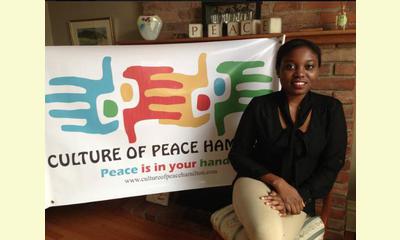|
|
Peace in our hands: Culture of Peace Hamilton (Ontario, Canada)
an article by Kathryn Ani-Otoibhi
Community peace-building organization Culture of
Peace Hamilton, is concerned with social justice,
and environmental and human rights advocacy for the
Hamilton public.

click on photo to enlarge
Culture of Peace Hamilton accepts the six
principles of peace created by Nobel Laureates for
the United Nations as a guide to sustain a
peaceful nonviolent community globally and in
Hamilton. Through the use of its Peace Dollars,
Culture of Peace intends to share its steps
towards a harmonious city to everyone they can
reach.
A Peace Dollar is a small piece of paper shaped
like a dollar bill with the Culture of Peace
principles displayed on it. Culture of Peace
Hamilton uses these principles to outline the
importance of respecting all life, rejecting
violence, sharing with others, politely listening
to understand, preserving the planet and
contributing to the development of the Hamilton
community.
These peace principles promoted by Culture of
Peace are important not only to those based in
Hamilton but also to visitors. With the spread of
a culture of peace, Hamilton visitors can enjoy
the sites of the city as well as the peacefulness
and positivity of the community, which they will
take with them back home.
Members and volunteers of the organization
recognize the significance of focusing on
nurturing a culture of peace. The overall aim is
to start promoting peace from our neighbourhood
because providing a peaceful community starts with
its residents. Culture of Peace Hamilton accepts
members of all ages, classes and backgrounds. The
organization is trying to build a connection with
both young and older people as well as other
social justice and environmental organizations in
Hamilton who are striving for a better community.
Making peace, just like any other complex goal, is
hard. Nevertheless, Culture of Peace Hamilton
organizes peace gardens, peace walks, peace-
education volunteering placements, social
meetings, fundraising yard sales and the like in
its approach to promoting peace and nonviolence
for the Hamilton community.
With peace in our hands, we can all build trusting
relationships in Hamilton and around the world.
For more information on Culture of Peace Hamilton
and upcoming events, check out the
Facebook page and website<
/a>.
|








|
DISCUSSION
Question(s) related to this article:
A decade of peace-building in Hamilton, what is its history?
* * * * *
LATEST READER COMMENT:
Here’s a bit of history.
On Sept. 19, 2000, 12 months before the twin towers fell in New York, The Hamilton Spectator devoted a page to a new idea from the United Nations. “The nature of a ‘Culture of Peace.’ Can it come to Hamilton? How can it make a difference?”
Among the 10 positive messages in the paper that day, the president of the Hamilton Chamber of Commerce wrote: “May I be the first of our 1,700 members representing 1,150 businesses and organizations employing 75,000 people to give you my pledge?”
At the start of this millennium there was plenty of optimism. The world held its breath in the hope that the new century would not be blemished by the great wars that had blighted the lives of so many families and loved ones in the century before.
In Paris, a group of Nobel Peace Prize laureates drafted six simple principles to help create peace. The United Nations General Assembly proclaimed the year 2000 the International Year for the Culture of Peace, and declared the ten years 2001 to 2010 the International Decade for the Culture of Peace. The Six Principles were published under the title, Manifesto 2000.
Although 75 million people around the world pledged to follow these principles, few North Americans or Europeans really heard about them. Within a few short months, the messages of peace and nonviolence were obliterated by a devastating attack on the U.S., wars in Afghanistan and Iraq, and a spreading culture of fear.
In Hamilton, a number of individuals staunchly supported the UN initiative from the beginning. A group, called Culture of Peace Hamilton, decided to spread the manifesto’s six principles and apply them locally. . ...more.

|
|








